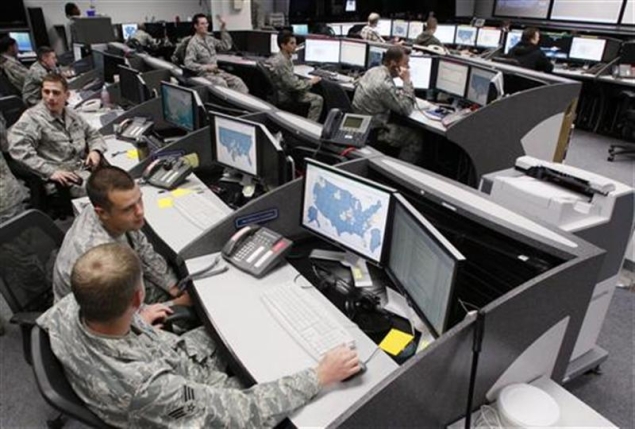- Home
- Internet
- Internet News
- US overhauling intelligence access to try to prevent another Snowden
US overhauling intelligence access to try to prevent another Snowden

The National Security Agency, which Snowden worked for as a Hawaii-based contractor, said it would lead the effort to isolate intelligence and implement a "two-man rule" for downloading - similar to procedures used to safeguard nuclear weapons.
"When are we taking countermeasures?. The answer is now," Deputy Defense Secretary Ashton Carter told the Aspen Security Forum in Colorado.
NSA Director General Keith Alexander told the forum the two-man rule would apply to system administrators like Snowden and anyone with access to sensitive computer server rooms.
"You limit the numbers of people who can write to removable media," Alexander said. "Instead of allowing all systems administrators (to do it), you drop it down to a few and use a two-person rule."
"We'll close and lock server rooms so that it takes two people to get in there."
Carter partly blamed the security breach on the emphasis placed on intelligence-sharing after the wake of the September 11, 2001, attacks, which eventually allowed someone like Snowden to access so many documents at once.
"We normally compartmentalize information for a very good reason, so one person can't compromise a lot," Carter said. "Loading everything onto one server it's something we can't do. Because it creates too much information in one place."
Alexander said Snowden had been trusted with moving inside networks to make sure the right information was on the computer servers of the NSA in Hawaii.
How much did Snoden steal?
Snowden fled to Hong Kong in May, a few weeks before publication in Britain's Guardian newspaper and the Washington Post of details he provided about secret U.S. government surveillance of Internet and phone traffic.
The disclosures by Snowden, who is wanted on espionage charges, have raised Americans' concerns about domestic spying and strained relations with some U.S. allies.
The 30-year-old American who has had his U.S. passport revoked, is stuck in the transit area of Moscow's Sheremetyevo airport and has applied for temporary asylum in Russia.
"A huge break in trust and confidence," Alexander said, adding that extremists, aware of the surveillance, were altering their behavior "and that's going to make our job tougher."
Alexander declined to say how many documents Snowden took, but when asked whether it was a lot, he said, "Yes."
Carter said the assessment was still being conducted, but "I can just tell you right now the damage was very substantial."
Senator Dianne Feinstein, who chairs the Senate Intelligence Committee, said last month that U.S. officials advised her that Snowden had roughly 200 classified documents.
But American officials and others familiar with Snowden's activities say they believe that at a minimum, he acquired tens of thousands of documents.
Asked whether U.S. officials had a good idea of what Snowden actually downloaded, as opposed to simply read, Alexander said, "We have good insights to that, yes."
Current and former U.S. officials said on condition of anonymity that while authorities now thought they knew which documents Snowden accessed, they were not yet entirely sure of all that he downloaded.
Snowden was adept at going into areas and then covering his tracks, which posed a challenge in trying to determine exactly what materials he had accessed, officials said.
Former and current U.S. officials told Reuters that a massive overhaul of the security measures governing such intelligence would be extremely expensive.
Alexander also said it would take time to implement across the Pentagon and the broader U.S. intelligence community. He also noted there were "15,000 enclaves," some of which are small.
"One of the things we can do is limit what people have access to at remote sites and we're doing both. So we're taking that on," he said.
Among U.S. allies, German Chancellor Angela Merkel is under pressure to toughen her stance on the U.S. program.
Alexander said the programme had helped European allies including Germany, France and Denmark, without offering details. Asked about his reaction to German expressions of surprise, Alexander stated: "We don't tell them everything we do or how we do it. Now they know."
© Thomson Reuters 2013
For the latest tech news and reviews, follow Gadgets 360 on X, Facebook, WhatsApp, Threads and Google News. For the latest videos on gadgets and tech, subscribe to our YouTube channel. If you want to know everything about top influencers, follow our in-house Who'sThat360 on Instagram and YouTube.
Related Stories
- Samsung Galaxy Unpacked 2025
- ChatGPT
- Redmi Note 14 Pro+
- iPhone 16
- Apple Vision Pro
- Oneplus 12
- OnePlus Nord CE 3 Lite 5G
- iPhone 13
- Xiaomi 14 Pro
- Oppo Find N3
- Tecno Spark Go (2023)
- Realme V30
- Best Phones Under 25000
- Samsung Galaxy S24 Series
- Cryptocurrency
- iQoo 12
- Samsung Galaxy S24 Ultra
- Giottus
- Samsung Galaxy Z Flip 5
- Apple 'Scary Fast'
- Housefull 5
- GoPro Hero 12 Black Review
- Invincible Season 2
- JioGlass
- HD Ready TV
- Laptop Under 50000
- Smartwatch Under 10000
- Latest Mobile Phones
- Compare Phones
- Huawei Enjoy 80
- Oppo K12s
- Honor X60 GT
- Vivo T4 5G
- Vivo X200 Ultra
- Vivo X200s
- Oppo K13 5G
- Infinix Note 50s 5G+
- Asus Vivobook S14 Flip (2025, Intel Core i5)
- Asus Vivobook S14 (2025, Intel Core i5)
- Vivo Pad SE
- Vivo Pad 5 Pro
- Vivo Watch 5
- Redmi Watch Move
- Xiaomi X Pro QLED 2025 (43-Inch)
- Xiaomi X Pro QLED 2025 (55-Inch)
- Nintendo Switch 2
- Sony PlayStation 5 Pro
- Toshiba 1.8 Ton 5 Star Inverter Split AC (RAS-24TKCV5G-INZ / RAS-24TACV5G-INZ)
- Toshiba 1.5 Ton 5 Star Inverter Split AC (RAS-18PKCV2G-IN / RAS-18PACV2G-IN)
















